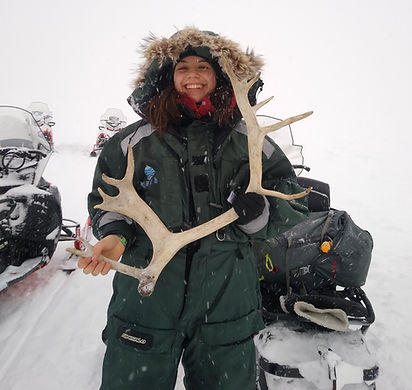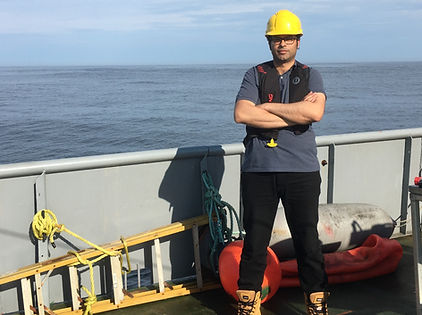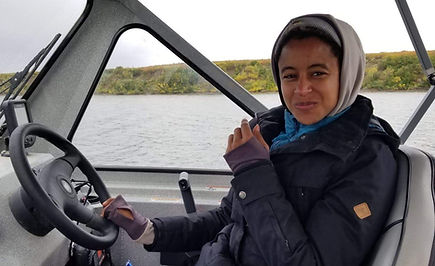
KATLEEN ROBERT
PhD Seafloor and Habitat Mapping
Assistant Professor, Marine Institute
My research aims at developing quantitative and repeatable approaches to map seafloor habitats. My focus has been on examining fine-scale species-environment relationships using benthic imagery, sidescan and multibeam sonars to build full coverage predictive maps. I am also looking at mapping deep-sea habitats at even greater resolutions using 3D point clouds and photogrammetry reconstructions.

POST DOC
Rylan Command
MSc. Student
I am investigating how phytoplankton dynamics influence megabenthic behaviour patterns in Conception Bay, Newfoundland. Specifically, my research focuses on seasonal variability in behavioural rhythms associated with the timing and strength of the spring phytoplankton bloom in the Bay. I will utilize depth-stratified sediment traps to quantify sinking organic material before, during, and after the spring phytoplankton bloom. Additionally, I will collect time-series data from

an underwater cabled observatory equipped with seafloor monitoring infrastructure, including a UHD-Video camera, CTD (conductivity-temperature-depth), ADCP (acoustic doppler current profiler), and an in-situ fluorometer. Cabled seafloor observatories allow for continuous, high-resolution data to be collected about oceanographic processes and community characteristics. Long-term monitoring will allow us to understand how random and seasonal events influence organism and community-level response to environmental change. My research is a collaboration between the 4D Oceans lab (Marine Institute), MEOPAR, and Ocean Networks Canada.
Ana Belén Yánez Suárez
Ph.D. candidate
I am a marine biologist and a National Geographic Explorer. I graduated with an International Master of Marine Biological Recourses (IMBRSea) at UGent (Belgium) and Sorbonne University (France), where I was awarded an Erasmus Mundus Join Master Scholarship. In my MSc research, I studied the effects of climate change and ocean eutrophication on tropical corals. I have been an alumnus of Conservation Leadership Programme since 2015 due to my early work in marine conservation and sustainable fisheries in marine protected areas in Ecuador. I worked in the coral reef restoration in the Caribbean, leading scientific diving expeditions in the Dominican Republic.

I collaborated on the Seamounts Project at the Charles Darwin Research Station in the Galapagos Islands, where I contributed to developing the first systematic characterization of deep-sea benthic invertebrate communities of the Islands. Through these experiences, I developed a strong interest in coral ecology. My doctoral research at 4D Oceans focuses on the dynamics of deep-water vertical habitats in the Galapagos Islands and the Charlie Gibbs Fracture Zone in the Mid-Atlantic Ridge. Through my PhD research, I aim to understand the links between environmental settings, cold-water coral habitat complexity, and the biodiversity of associated communities in vertical walls that are generally overlooked due to technological limitations.
Emmeline Broad
Ph.D. Student
I am an early career benthic ecologist with a particular interest in the conservation of deep-sea vulnerable habitats.I graduated in 2020 with an MSci in Marine Biology from the University of Southampton (UK). My dissertation focused on using fine scale multibeam bathymetry and imagery obtained from an ROV, to map deep sea vulnerable marine ecosystems off Southwest Greenland.After graduating, I held a position in the benthic ecology team in the Institute of

Zoology, Zoological Society of London. My research focused on evaluating several years of drop video imagery and multibeam bathymetry to map polar seabed habitats on the Western Greenland shelf. This work provided baseline information on the distribution, structure and abundance of habitat forming organisms in the region, which will help support the sustainable management of Greenland’s cold water prawn fishery.
My PhD project sits in the wider BEcoME project (WP2) which aims to evaluate the role that geomorphology plays in predicting shifting species patterns in the NW Atlantic in response to the effects of climate change. Using recently obtained high resolution multibeam bathymetry, I will focus on building a number of habitat suitability models under present and future climate change conditions. These predictions may help us understand if there is suitable habitat available which could support vulnerable taxa that are predicted to migrate poleward in response to climate change.
Antonia Kotliarov
MSc. Student
I received my BSc in Marine Sciences from the University of Maine, where I looked at differences in benthic community make-up at active and peripheral areas of a methane seep site for my honors thesis. This project sparked my interest in benthic ecology and led me to pursuing my masters in Fisheries Science and Technology with the 4D Oceans lab and the SEAM at Dalhousie, where I will be characterizing the benthos of northern PEI around a potential area of freshwater discharge and exploring possible influences on the benthic community.

Julia Mackin-McLaughlin
MSc. Student
Julia Mackin-McLaughlin graduated with a Bachelor of Science in Marine Biology from the University of Maine in 2017. Since then, she has worked in the academic field as a research technician. Her primary interest has been benthic ecology, with most of her previous work looking at how marine benthic microbial communities influence nutrient flux in an estuarine environment.
Currently, she is studying for a Master of Science in Geography from Memorial

University of Newfoundland. Her project involves habitat mapping of Placentia Bay in Newfoundland, so that a baseline understanding of the benthic ecology can be achieved and monitored for changes via anthropogenic influence. She is keen to familiarize and utilize the ever-changing technology used by oceanographers and marine biologists to further scientific research in the marine field.
Salem Morsy
Post doctoral research fellow
I obtained my PhD degree in Geomatics Engineering from the Department of Civil Engineering, Toronto Metropolitan University (formerly Ryerson University). My dissertation focused on Light Detection And Ranging (LiDAR) point cloud processing for land/water delineation and land cover classification of urban areas. My research interests are LiDAR point cloud processing using machine learning algorithms for Scan-to-BIM applications, including urban areas classification and road features extraction.

My current research is a part of Benthic Ecosystem Mapping & Engagement (BEcoME) project, working package 4.2, one of the Ocean Frontiers Institute (OFI) projects. My role in this project is to apply remote sensing technologies, such as structure from motion and color laser scanners, and develop segmentation and classification approaches for 3D high resolution mapping of seabed species and monitoring of habitat change over large survey areas.
CURRENT STUDENTS
Jennifer Oteng
MSc. Student
I graduated with a Bachelor’s in Geomatic Engineering from the University of Mines and Technology - Ghana. After my bachelors, I gained a year’s hydrography experience with the Ghana Ports and Harbour Authority. I had about six years of experience working in the mine also worked as a student application tester for Teledyne CARIS using Sonar Noise Classifier in AWS. Currently in my final year pursuing master’s in Applied Ocean Technology. At the 4D’ s Ocean Mapping Lab,

I process multibeam echo-sounding data to generate bathymetry and backscatter surfaces.
Kaitlyn Charmley
MSc. Student
My scientific interests are marine megafauna ecology and the drivers of habitat selection in these species. I graduated from the University of Guelph in 2018, with a bachelor’s degree in Wildlife Biology and Conservation. My MSc. research, at the Memorial University of Newfoundland, is in partnership with MEOPAR. I am focusing on characterizing the environmental drivers of both spatial and temporal variation in megabenthic habitat use in Conception Bay, Newfoundland. I will be

creating seasonal habitat classification maps and species distribution maps, with an emphasis on snow crab populations. To do this, I will be using acoustic data, a drop camera system, and a CTD. Understanding the spatio-temporal variation in these species-environment relationships is important because it allows us to create a baseline that we can reference when assessing future environmental changes. It also allows us to predict how affected marine species may respond in the face of these changes.
Myrah Graham
MSc. Student
My background is in environmental science, for which I earned a BSc from McGill University. During this time, my research examined coral disease and diversity on the western coast of Barbados. As a master’s student in the 4D Oceans Lab, I will focus on the spatial distribution of the benthic ecology of two arctic fjords on Qikiqtaauk (Baffin Island). This is a joint project between the 4D Oceans Lab at Memorial University, Fisheries and Oceans Canada, and Natural Resources

Canada, with data collected from Inuit Nunangat.Multibeam data and video imagery of Pangnirtung Fjord and Southwind Fjord will be used to characterize and compare these two seascapes and their biodiversity. By combining biological imagery with bathymetry and backscatter layers, I hope to ultimately create baseline maps and benthic records of these two fjords.
Ashley Nickson
Bsc. (Honours) Student
Ashley Nickson completed her high school in Montréal, Québec, at John Rennie High School in a Sport-Études (honours) Horseback riding/CrossFit program. She is presently completing a Bachelor of Science (Honours) in Marine Biology from Memorial University of Newfoundland.
As a first 4D Oceans Lab undergraduate honours student, her project is focused on the Northeast Atlantic Ocean whereby examining the megabenthic biotope composition of the Rockall Escarpment. She is currently conducting multivariate analysis in R programming to identify the discriminating species of these biotopes along with potential environmental variables influencing their distribution and composition.
.jpg)
Zachary MacMillan-Kenny
MSc. Student
I completed my Bachelor of Science in Marine Biology from Dalhousie University in 2021. My research interests are centered around the ecology and distribution of organisms and habitats in benthic and deep-sea environments. I am now enrolled in the department of Geography at Memorial University of Newfoundland as a MSc student with the 4D Oceans Lab. Working alongside the government of Nunatsiavut and Fisheries & Oceans Canada, my research project focuses

on seafloor habitat mapping of coastal sites around Nain, Labrador. Specifically, I am investigating which benthic habitats are occupied by two fish species (i.e., Arctic charr, rock cod) that have traditionally been a large part of Inuit subsistence in the Nain region. Additionally, I will evaluate if the region contains habitats with high biodiversity and/or contains habitats sensitive to anthropogenic stressors, while also assessing the similarity of these habitats (e.g., species, structure) compared to those in adjacent biogeographic regions. To conduct this study, I will be gathering data from a variety of ocean technologies (e.g., multibeam echosounder, CTD, drop camera system) to create benthic habitat maps of northern Labrador.



